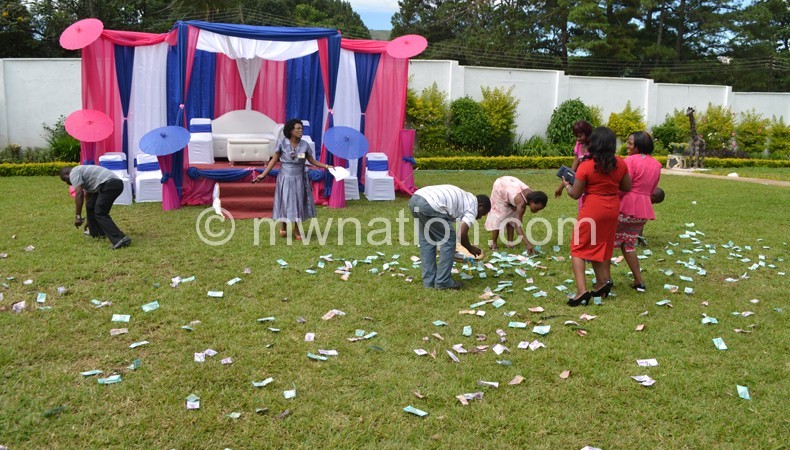Where is our chinkhoswe going?
In Africa, an individual’s existence is not nearly as important as that of the community to which that individual belongs. As they say, it is a matter of “I am because we are”. The community is always paramount and the individual is regarded as being of secondary importance.
Whereas in Europe, and elsewhere, marriage is basically an affair between two individuals, in Africa it is between two families or two communities. The bride and groom literally bring two communities together and merge them.
 In Malawi, the two communities get to know each other at a ceremony called chinkhoswe. Chinkhoswe is more than an engagement ceremony in the sense that it involves more people than just the two. In Europe, couples can engage in a private function at a pub. Nobody else needs to be present. Not so in Africa.
In Malawi, the two communities get to know each other at a ceremony called chinkhoswe. Chinkhoswe is more than an engagement ceremony in the sense that it involves more people than just the two. In Europe, couples can engage in a private function at a pub. Nobody else needs to be present. Not so in Africa.
Chinkhoswe provides an opportunity for the parents and relatives of the bridegroom-to-be to meet their counterparts from the bride-to-be side. It is, therefore, purely a family affair. Or at least should be, in its purest form.
Somehow this ceremony has over the past few years been hijacked into a fundraising function. Many people are invited to the function, music played, food served and many rounds of perekani-perekani (coerced giving) staged. The people that grace chinkhoswe ceremonies these days are not necessarily family members. In fact the family members would be outnumbered by “outsiders” by a wide margin. People attend chinkhoswe like they would the actual wedding.
I once attended a chinkhoswe ceremony in Nyambadwe. Getting close to the venue, I noticed that there were so many cars that it was difficult to find parking space. I had no choice, but to drive to the lower end of the road, park there and walk all the way back. Everybody I knew in town seemed to be at that ceremony. After a few rounds of perekani-perekani I decided to leave.
This was not an isolated case. Many people stage chinkhoswe ceremonies at that scale. I have always wondered what such functions are intended to achieve. I think we have gone off target in a big way, insofar as the purpose of chinkhoswe is concerned. It has become wedding part A. It is like the first half of the wedding game while the actual wedding is the second half.
Even those people who do not traditionally practice chinkhoswe in their cultures have jumped on the bandwagon. The pomp, the monetary gains, the publicity that go along with chinkhoswe have been too great for them to resist.
Many churches expect that couples will not live together unless and until they have been officially wedded. Therefore, the real day to look forward to by couples ought to be the wedding day. With the overblown chinkhoswe functions, unfortunately, the wedding day blurs into some insignificance. As a result, many more couples than before are feeling justified to start living together after the chinkhoswe ceremony. They will have raised the start-up funds; they will have received the gifts; they will have received just about everything save the pastor’s blessing. What would stop them from going all the way?
There is urgent need to review the manner in which chinkhoswe is carried out. About twenty years ago, all that was required was the suitor’s parents, uncles, aunts, brothers and sisters to meet their opposite numbers at a strictly private function, usually at the lady’s home (or lady’s relative’s home). They would ask each other a few questions then the suitor’s entourage would present items like a hoe, an axe, a pail, a basket (dengu), some plates. Perekani perekani was not part of the deal.
Where is our chinkhoswe going? What purpose does it serve? These are the questions we need to direct to ourselves in an attempt to rediscover the right place of the chinkhoswe ceremony in the marriages of our young couples. We may have been carried away by the glitz of a chinkhoswe function staged by somebody we knew, but I would urge that we go back to basics and put chinkhoswe in its proper context. I rest my case.
**The author is a provider of printing services and a social commentator.


I am lucky we dont have Chinkhoswe in my culture, and I will not have one when I plan to marry! I will simply pay my “Malobolo” (Lobola), and hollaaa – straight to my parish priest after a while for the wedding blessing. Not these many useless events as Chinkhoswe, Send-Off, Bridal Shower, Hen Party, etc… Am sad though that some people from my culture are also getting trapped into these “fundraising” events!